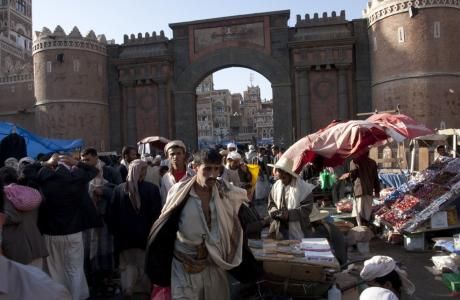On May 3, as the United Nations marked World Press Freedom day, Reporters Without Borders released a list of the world's worst "predators of press freedom." One of the new additions to the list this year was Yemeni president Ali Abdullah Saleh.
"Since May 2009 we observed a very bad evolution, with a lot of trials, with a lot of journalists in prison, a lot of journalists harassed and it is really the worst evolution of media freedom in the world," said Gilles Lordet, director of research at the organization told Voice of America.
The unflattering recognition that the Yemeni government received seemed particularly well-timed given that two of our friends and colleagues had been detained and interrogated for nearly sixty hours by Yemeni intelligence officers the week before and later deported from Yemen. The two American journalists, Adam Reynolds and Heather Murdock, were working on a story about Yemen's southern separatists when they were arrested by political security, ostensibly because they had traveled to an area of south Yemen without permission from the government, permission that never would have been granted. Adam and Heather were held for 3 days without any contact with the American Embassy, their equipment was confiscated and has yet to be returned, and the Yemeni Embassy in Washington has used their case to try to intimidate other foreign journalists here in Sana'a.
Adam and Heather's deportation is part of a worrying trend to foreign academics, experts, journalists, and other observers being denied entry or kicked out of the country for reporting on sensitive stories.
Of course, foreign journalists have a less to worry about than Yemeni journalists trying to work under increasingly oppressive circumstances. In southern Yemen, where Adam and Heather were held, eight newspapers were shut down in 2009, according to the Committee to Protect Journalists, and scores of journalists have been harassed and imprisoned for reporting on the "Southern Movement," a loose coalition of groups calling for the secession of former South Yemen.
In March, broadcast equipment was confiscated from the local offices of Al-Jazeera television in Sana'a after the government complained about its coverage of the movement.
Amnesty International recently called for the release of Hussein Mohammed al-Leswas, 25, who was sentenced to a year in prison last Sunday for "defamation of a public official". Al-Lewas was prosecuted for stories about mismanagment corruption at the government-run electricity company and corruption in the local administration in the southern province of Al-Baydha.
"This unjust conviction is the latest example of the Yemeni authorities' crackdown on journalists and appears to reflect growing government intolerance of media and other peaceful criticism of the authorities," said Philip Luther, Amnesty International's Deputy Director for the Middle East and North Africa in a press release.
Amnesty International has also criticized the prosecution of Muhammad al-Maqalih, a journalist covering the Houthi conflict in northern Yemen and a editor of the opposition socialist party's website, who was abducted off the streets of Sana'a by security forces last fall and held incommunicado for over 5 months. He is now charged with "defaming the President," broadcasting information against security forces, and supporting followers of the cleric Hussein al-Huthi and, if convicted, could face the death penalty.
Yemen's crackdown on the press may be just another symptom of the fragile state that the country is in. As the country is hobbled by internal strife and corruption, it seems to have taken the view that the press, by reporting on these issues, is exacerbating them. That view may hold, and conditions may only worsen for the press, as the 2012 presidential elections approach the secession of Saleh becomes the most important priority for the regime.
